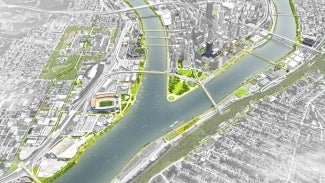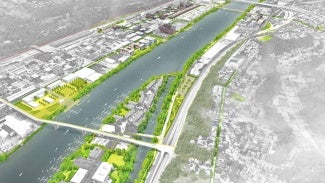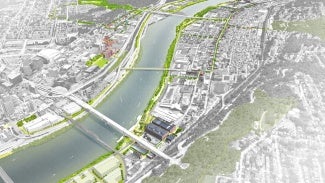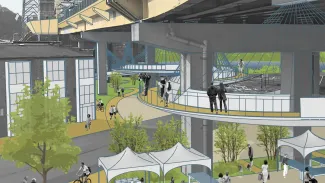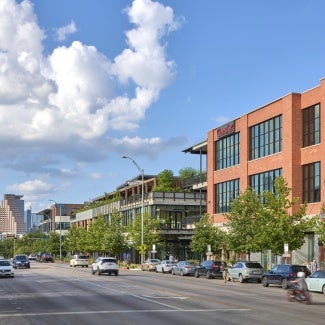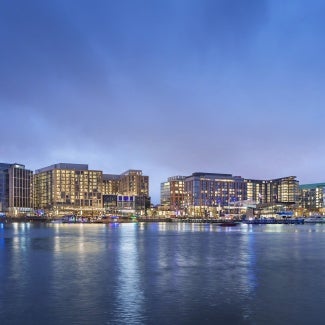Completing the Loop
The award-winning regional and urban design for Completing the Loop revitalizes 15 miles of Pittsburgh’s riverfront land and connects previously disconnected communities.
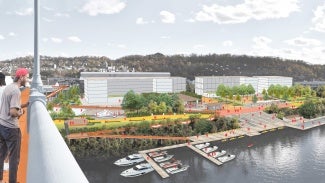
Project highlights: East End Transformation
- Architect: evolve environment :: architecture
- Owner: Riverlife
- Location: Pittsburgh
A comprehensive vision for revitalizing 15 miles of Pittsburgh’s riverfront land, Completing the Loop is a master plan that articulates and advances the mission of Riverlife, a nonprofit dedicated to connecting the city’s neighborhoods with a world-class riverfront. It is the result of an 18-month-long community-centered process, and it clearly describes the steps needed to transform vacant, formerly industrial land to connect Pittsburgh’s celebrated three rivers with communities that have been historically cut off from them by highways and railroads.
Riverlife was founded in 1999 as an effort to reenvision Pittsburgh’s riverfront as a highlight of community life through a continuous park system known as the Loop. An earlier vision plan, completed in 2001, described an initial attempt at forming a system based on several strong anchors along the riverfront. However, there were still many gaps to fill and connections to be forged before that vision could be realized. For more than 20 years, the nonprofit has worked closely with landowners, community groups, and elected officials, fostering investment and land use regulations that have moved development steps closer to the intentions laid out in the original plan.
Completing the Loop builds upon the earlier placemaking and planning efforts to refresh and refine the original vision for the riverfront, proposing a set of guiding principles and catalytic projects that will form a cohesive river experience. It arose from an intensive collaboration with the people and organizations that love the Allegheny, Ohio, and Monongahela rivers, ranging from those who occasionally visit to those who work the waterways daily. Throughout the process, which engaged more than 5,000 people, the team and Riverlife pursued a common vision of an equitable riverfront, resulting in a slate of exciting new ideas and a sense of urgency that drives continued progress.
At the high of the city’s industrial prowess, most people avoided the rivers. The demise of its mills left degraded landscapes and large-scale contamination in their wake. In the ensuing decades, a handful of projects established some riverfront desirability, and Riverlife has woven them into a network of riverscapes that restore the rivers’ ecology, reestablishing healthy environments for humans and nonhumans alike.
In support of this, the plan calls for the formation of three discrete River Rooms, a series of water commons where people from all walks of life can engage with one another in an ecological setting and where the city’s stewardship of its rivers enhances the quality of life for all residents. Water is the primary resource and focus of the plan, and all additional developments and activities highlighted in Completing the Loop reference it. In neighborhoods where existing physical barriers limit river access, the plan proposes green street connections, places where public art, amenities, and plantings boost water quality while also serving as a biophilic wayfinding strategy.
In building on previous successes, Completing the Loop focuses directly on equitable principles for development. Riverlife’s efforts have already yielded more than $4.2 billion in projects and enhancements as well as a $40 million renovation of Point State Park. This enhanced plan is expected to leverage both public and private investments of nearly $4.9 billion across the next decade. With its call for affordable housing, the use of a community land trust, and several community wealth-building tools, the plan ensures that everyone in Pittsburgh will benefit.
Project team & jury
Financial Consultant: Fourth Economy
Development Strategy Consultant: Thread Strategies
Victor Buchholz, AIA, Chair, LPK, Memphis, Tenn.
Kotaro Nakamura, AIA, RNT Architects, San Diego
Marilys Nepomechie, FAIA, Florida International University, Miami
Vanessa Quirk, New York
Yuting Zhang, AIA, Gensler, Boston
A Regional & Urban Design Award recognizes the best in urban design, regional and city planning, and community development.
Five projects showcase 2023's best planning projects that account for the entire built environment, local culture, and available resources.

